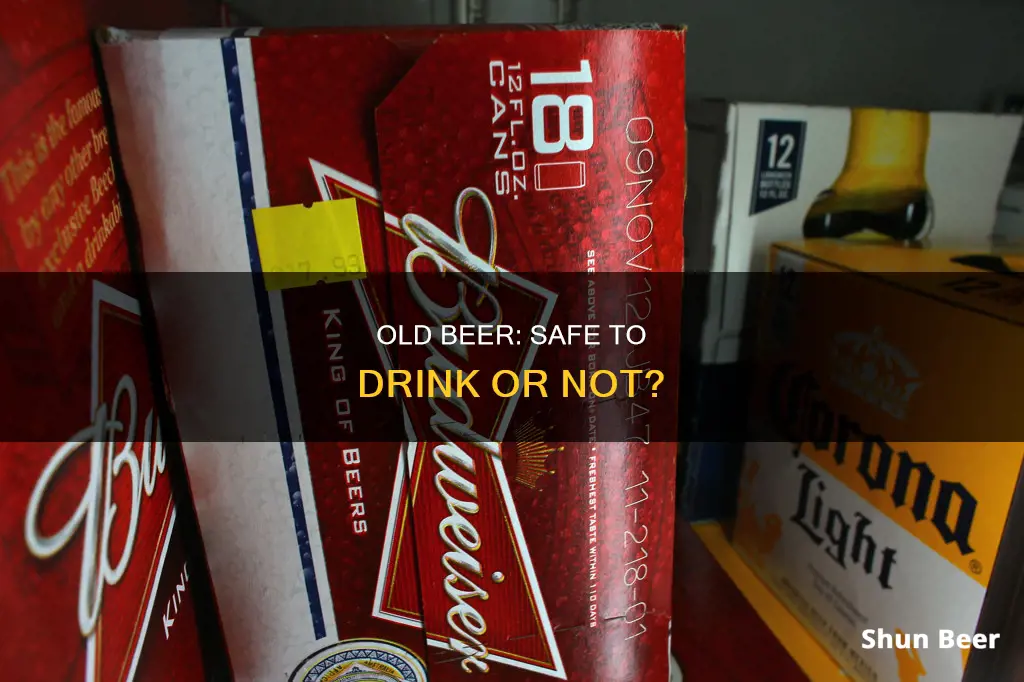
Many people wonder if it is safe to drink beer that is past its best before date. The short answer is yes, drinking old beer is not dangerous. Beer doesn't expire in the same way milk does, and old beer won't make you sick. However, the flavour can change and turn tremendously. The main factors that cause beer to spoil or skunk are light, oxygen, heat, and time. Hops are sensitive to UV radiation from the sun, so most beer bottles are tinted brown to prevent this. Additionally, oxidation is generally seen as having a negative effect on beer. High heat can also make beer go stale, but a bit of time at room temperature won't hurt it.
| Characteristics | Values |
|---|---|
| Will it make you sick? | No |
| Will it hurt you? | No |
| Will it taste good? | Depends on the type of beer, how it was stored, etc. |
| Will it be flat? | Yes |
| Will it be stale? | Yes |
| Will it be skunky? | Yes |
What You'll Learn

Is it harmful to drink year-old beer?
Drinking year-old beer is not harmful to your health, but it might not taste very nice. Beer doesn't expire in the same way that milk does, and it won't make you sick. The worst that can happen is that it will taste bad. However, its flavour can change, and it can turn tremendously.
There are four main factors that can cause beer to spoil or "skunk": light, oxygen, heat, and time. Hops are sensitive to UV radiation from the sun, which is why most beer bottles are tinted brown. Even if exposed to sunlight for under an hour, beer will undergo a chemical reaction that produces 3-methyl crotyl mercaptan, a compound that gives off a distinct skunky flavour.
Oxidation is also generally seen as having a negative effect on beer. No matter how well the beer is canned or bottled, there's always a small amount of oxygen in each vessel. For most light styles, like pilsners, oxidation sets in rapidly. Those bright, malty flavours are fragile and can quickly turn into acidic flavours of stewed tomatoes with a cardboard-like aftertaste.
High heat can also make beer go stale, but a bit of time at room temperature won't hurt it. Beer that is stored at room temperature should be re-refrigerated, though.
Flavours in hoppy beers tend to dwindle after the three- to six-month mark due to the fragility of their fresh ingredients and the factors mentioned above. On the other hand, bottle-conditioned beers with an ABV of 9% or higher will generally be fine if aged for over a year. Flavours will break down and organic compounds will continue to produce new reactions and nuances, which can actually improve the profile of bigger, maltier brews.
The type of beer also makes a difference. For example, pilsners are best enjoyed as fresh as possible, while heavier beers like stouts and porters can hold up in flavour after a couple of years in the cellar.
Beer and Wheat Belly Diet: What You Need to Know
You may want to see also

Will year-old beer taste good?
It depends on a few factors. Firstly, the type of beer matters. Some beers are more likely to taste good after a year than others. For example, bottle-conditioned beers with an ABV of 9% or higher will generally be fine if aged for over a year. Heavier beers like stouts and porters can also hold up in flavour after a couple of years. Beers with a lot of hops and high alcohol content can remain drinkable for a few years. Beers with yeast in the bottle should also age well.
Secondly, the way the beer has been stored is important. Beer doesn't pair well with light, oxygen, heat, or time. Hops are sensitive to UV radiation from the sun, so exposure to sunlight can cause a chemical reaction that produces a compound with a distinct skunky flavour. Oxidation is also generally seen as having a negative effect on beer. High heat can also make beer go stale. However, a bit of time at room temperature won't hurt.
Finally, it's worth noting that beer doesn't expire in the same way milk does. Drinking old beer won't make you sick, but it might taste bad.
Drinking a Dozen Beers Daily: Is It Unhealthy?
You may want to see also

What are the factors that affect the taste of year-old beer?
The taste of year-old beer depends on a variety of factors, including the type of beer, how it was stored, and its ingredients.
Firstly, the type of beer is a crucial factor. Beers with a high ABV, such as bottle-conditioned beers with an ABV of 9% or higher, tend to improve with age. Aging can remove the "hot" taste from high-alcohol beers and mellow them out. On the other hand, hoppy beers like IPAs are best enjoyed fresh, as their flavours tend to dwindle after three to six months due to the fragility of hops. Similarly, pilsners, lagers, and wheat beers are best consumed fresh, as oxidation can quickly turn their bright, malty flavours into acidic flavours of stewed tomatoes with a cardboard-like aftertaste.
Secondly, the storage conditions of the beer play a significant role in its taste over time. Light, oxygen, and heat are the main culprits of spoiled or "skunked" beer. Hops are sensitive to UV radiation, so exposure to sunlight, even for under an hour, can cause a chemical reaction that produces a distinct skunky flavour. Additionally, oxidation can negatively impact the beer, causing the bright, malty flavours to turn into acidic flavours. High heat can also make beer go stale, so storing beer in a cool, dark place like a cellar or closet is ideal.
Lastly, the ingredients used in the beer can affect its taste over time. Beers with fresh ingredients, such as hops and plant matter, may taste "green" due to hop burn and astringency from fresh plant matter. However, letting the beer sit in the fridge for about a week can help mellow out this harshness. Additionally, the presence of adjuncts, such as lactose in a blueberry pie milkshake IPA, can decrease the stability of the beer and shorten its lifespan.
In summary, the taste of year-old beer will depend on the type of beer, its storage conditions, and its ingredients. While some beers improve with age, others are best enjoyed fresh to avoid flavour deterioration and oxidation. Proper storage in a cool, dark place can help prolong the beer's optimal taste.
Beer and Penicillin: Safe Mix?
You may want to see also

How long does beer last?
Beer doesn't expire in the same way that milk does. Drinking old beer won't make you sick, but it might taste bad. The shelf life of beer depends on a variety of factors, including the type of beer, how it was stored, and its ingredients.
Beer has four main culprits of spoilage: light, oxygen, heat, and time. Hops are sensitive to UV radiation, so most beer bottles are tinted brown to prevent exposure. Even a short amount of time in the sun can cause a chemical reaction that produces 3-methyl crotyl mercaptan, a compound that gives off a distinct skunky flavour.
Oxidation also negatively affects beer. Oxygen is present in every vessel of beer, and for most light styles like pilsners, oxidation sets in quickly. Bright, malty flavours can turn into acidic flavours of stewed tomatoes with a cardboard-like aftertaste.
High heat can also make beer go stale, but a bit of time at room temperature won't hurt it. Beer should be stored in a cool, dark area, and ideally in a refrigerator.
The ingredients in beer also affect its shelf life. Beers with a high alcohol content, lots of hops, and high sugar content can remain drinkable for several years. Bottle-conditioned beers with an ABV of 9% or higher will generally be fine if aged for over a year. Flavours will break down and organic compounds will continue to produce new reactions and nuances, which can improve the profile of bigger, maltier brews.
On the other hand, beers with a low alcohol content, minimal hops, and adjuncts like lactose won't age well. IPAs are best enjoyed as fresh as possible, as their high hop content can make them taste "green", which can be tough on the palate and the digestive system. After a few months, an IPA's hop aromas will become muted.
Lagers and wheat beers have more hops than pilsners, so their flavours and aromatics can start to dull after about three months. Stouts and porters, meanwhile, can hold up in flavour after a couple of years in the cellar, although they tend to lose their foam stability over time.
Ultimately, the shelf life of beer varies depending on its ingredients and how it is stored. While old beer won't make you sick, it may not taste very good.
Beer Drinking: Dehydrating Effects and What You Need to Know
You may want to see also

What are some beers that can be aged?
While most beers are designed to be enjoyed fresh, there are some that can be aged and will even improve with age. However, it's important to note that ageing beer is a gamble, and there is no guarantee that it will taste better than when it was fresh.
Beers that are suitable for ageing include:
- Rumpkin Pumpkin Ale by Avery Brewing Company
- Bourbon County Brand Stout by Goose Island Beer Company
- Vintage English Strong Ale by Innis & Gunn
- Ovila Abbey Quad with Cherries by Sierra Nevada Brewing Company
- Thirteenth Hour Belgian-Style Stout by Samuel Adams
- Yeti Imperial Stout by Great Divide Brewing Company
- Oude Geuze by Brouwerij Drie Fonteinen
- Crossfade Blended Farmhouse Ale by Oxbow Brewing Company
- Widdershin Barleywine by Left Hand Brewing Company
Beers that are not suitable for ageing include IPAs, dry-hopped beers, and most lagers, especially pilsners.
When ageing beer, it is important to store it in a dark, cool place, such as a fridge or closet, and to ensure that the temperature remains consistent. The ideal temperature range for ageing beer is between 55 to 60 degrees Fahrenheit.
Quitting Beer Cold Turkey: Is It Possible?
You may want to see also
Frequently asked questions
Yes, drinking a year-old beer is safe. Beer doesn't breed things like botulism and it won't make you sick. The worst that can happen is that it will taste bad.
The four main culprits of spoiled or "skunked" beer are light, oxygen, heat, and time. Beer is sensitive to UV radiation from the sun, so exposure to sunlight can cause a chemical reaction that produces a compound with a distinct skunky flavour. Oxidation can also negatively affect beer, causing bright, malty flavours to turn into acidic flavours of stewed tomatoes with a cardboard-like aftertaste.
Bottle-conditioned beers with an ABV of 9% or higher will generally be fine if aged for over a year. Lambics, gueuzes, and saisons are also known to age well due to their intricate yeast and microflora.
Pilsners, lagers, wheat beers, and IPAs tend to "expire" faster and will have a shorter shelf life.







